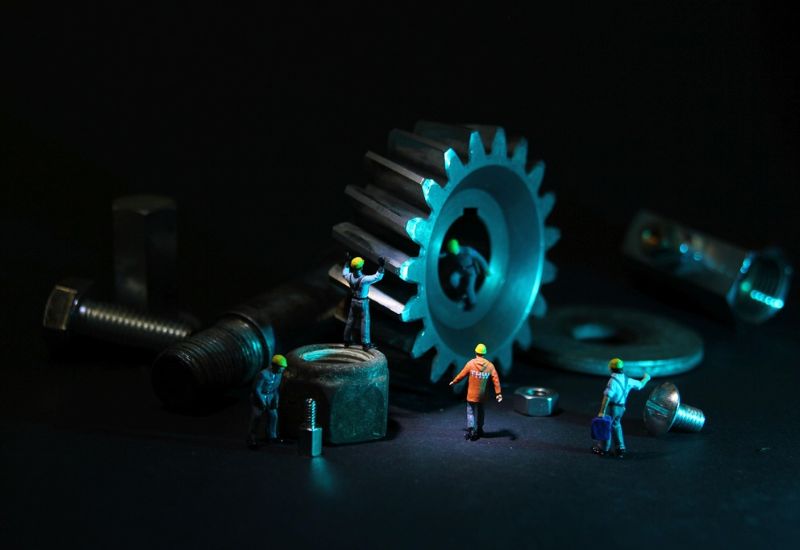What is Mechanical Engineering?
Mechanical engineering is the branch of engineering that focuses on the design, development, production, and maintenance of mechanical systems. These systems can range from tiny micro machines to massive power plants.
At its core, mechanical engineering involves the application of physics, mathematics, and material science to analyse, design, and manufacture mechanical systems. It is one of the broadest engineering disciplines and intersects with many other fields, such as electrical engineering, aerospace, automotive, civil, and even biomedical engineering.
Also Check – Placement Opportunities for Engineering Students
Areas Mechanical Engineers Typically Work In:
- Thermodynamics
- Fluid mechanics
- Robotics and automation
- Materials science
- Product design
- Mechatronics
- Manufacturing processes
What is Mechanical Engineering in the real world? It’s the science behind engines, air conditioners, wind turbines, and even prosthetic limbs. Mechanical engineers create the mechanisms that move, heat, cool, or support systems in almost every industry.
The Evolution of Mechanical Engineering
The history of mechanical engineering traces back to ancient civilisations where devices like the water wheel and windmill were early examples of mechanical innovation. With the Industrial Revolution came the birth of modern mechanical engineering, as machines replaced manual labour.
Today, mechanical engineering has evolved into a high tech discipline. It now incorporates elements of computer-aided design (CAD), artificial intelligence, data analysis, and sustainability.
Scope of Mechanical Engineering in India and Globally
The scope of mechanical engineering is vast and continuously expanding with technological advancements. Here’s how this domain is thriving:
1. Core Industries
Mechanical engineers are indispensable in core industries such as:
- Automotive
- Aerospace
- Power and Energy
- Manufacturing
- Oil and Gas
- HVAC and Refrigeration
2. Emerging Technologies
Mechanical engineering has adapted to several high growth sectors, like:
- Robotics and Automation – Designing robots for industrial applications
- Mechatronics – Integration of electronics and mechanics
- 3D Printing/Additive Manufacturing – Revolutionising prototyping and production
- Renewable Energy – Designing wind turbines, solar panels, etc.
3. Research and Development
Mechanical engineers contribute significantly to R&D in areas such as composite materials, nanotechnology, and artificial intelligence applications in machinery.
4. Government and Defence Sectors
Organisations like ISRO, DRDO, and BHEL recruit mechanical engineers for strategic projects.
The flexibility of mechanical engineering allows graduates to explore not just one but multiple industries, ensuring long-term career resilience.
Also Check – Best Training and Placement Engineering College
Key Skills Required in Mechanical Engineering
Understanding what is mechanical engineering also means identifying the crucial skills that form the base of a successful mechanical engineer. This dynamic field is about solving complex real world problems using a mix of theory, creativity, and technical expertise. Here’s an elaboration on the essential skills every mechanical engineer must master:
1. Analytical and Problem Solving Skills
Mechanical engineers constantly face technical challenges, from designing systems to troubleshooting failures. They must approach problems logically, evaluate alternatives, and implement effective, analytical solutions.
2. Creativity and Innovation
Designing efficient machines or improving processes requires more than formulas, it calls for innovation. Engineers must think creatively to develop solutions that are not only functional but also cost effective and sustainable.
3. Strong Mathematical and Scientific Base
Math and physics underpin every engineering calculation, from stress analysis to thermodynamics. A deep understanding of these subjects helps engineers model systems accurately and ensure reliability and performance.
4. Communication Skills
Mechanical engineers must explain complex ideas to colleagues, clients, or non-technical stakeholders. Strong written and verbal communication is vital for documentation, presentations, and teamwork.
5. Proficiency in CAD and Simulation Tools
Modern mechanical engineering relies heavily on digital tools. Proficiency in CAD (like AutoCAD and SolidWorks) and simulation software (like ANSYS, MATLAB) is essential for designing and testing components before manufacturing.
6. Attention to Detail
Precision is everything in engineering. Even minor errors can lead to costly or dangerous consequences. Engineers must ensure that every dimension, material specification, and calculation is accurate to prevent failure.
These skills collectively shape the base of a mechanical engineer’s capabilities, ensuring both academic success and industry readiness.
Mechanical Engineering Curriculum Overview
A standard 4-year B.E./B. Tech program in Mechanical Engineering at institutes like MVIT includes the following:
Core Subjects
- Engineering Mechanics
- Thermodynamics
- Fluid Mechanics
- Heat Transfer
- Dynamics of Machines
- Strength of Materials
- Manufacturing Technology
- Machine Design
- Mechatronics
Labs & Practical Exposure
- CAD/CAM Lab
- Thermal Engineering Lab
- CNC Machines Lab
- Robotics and Automation Lab
Electives
Students can specialise in areas like:
- Automotive Engineering
- Renewable Energy
- Aerospace Engineering
- Robotics and Control Systems
Project work in the final year further reinforces practical learning and innovation.
Career Opportunities in Mechanical Engineering

So, what is mechanical engineering leading to in terms of a career? Let’s explore the wide spectrum of roles and opportunities that this dynamic field offers across various industries and sectors.
1) Design Engineer
Design engineers are responsible for creating technical drawings and 3D models of machines, components, and systems using advanced CAD tools like AutoCAD and SolidWorks. They bridge creativity and functionality, often working closely with R&D and production teams.
2) Maintenance Engineer
These professionals ensure that machinery, mechanical systems, and production lines operate efficiently without breakdowns. Their role is crucial in minimising downtime and maintaining safety standards in manufacturing plants and utilities.
3) Manufacturing Engineer
Tasked with improving manufacturing processes, these engineers aim to maximise productivity, reduce waste, and enhance product quality. They often work with automation technologies and lean manufacturing techniques.
4) HVAC Engineer
HVAC engineers design systems that regulate indoor environments in commercial and residential buildings. Their knowledge of thermodynamics and fluid mechanics is vital in ensuring energy efficiency and comfort.
5) Robotics Engineer
As automation becomes mainstream, robotics engineers are in demand to design, program, and maintain robotic systems used in factories, healthcare, and research sectors.
6) Aerospace Engineer
This role involves designing and maintaining aircraft, spacecraft, and defense systems. Mechanical engineers with a flair for aerodynamics and structural analysis excel in this niche.
7) Quality Control Engineer
They ensure that all products meet industry, customer, and safety standards through inspections, testing, and audits.
8) Government Services and PSUs
Mechanical engineers with competitive exam qualifications (like GATE) can join elite organisations such as BHEL, ONGC, ISRO, and Indian Railways, contributing to nation-building projects and technological advancements.
Higher Education and Specialisations
After graduation, students can pursue:
- M.Tech/M.E. in Thermal, Design, or Manufacturing Engineering
- MBA for techno-managerial roles
- MS abroad in Robotics, Mechatronics, or Aerospace
- PhD in advanced research areas
With AI, IoT, and automation reshaping industries, mechanical engineers with cross-disciplinary skills are in higher demand than ever.
The Global Impact of Mechanical Engineers
Mechanical engineers are problem solvers for the world. If it’s building wind turbines in Germany, designing robotic prosthetics in Japan, or working on Mars rovers at NASA, their work transcends borders.
In fact, a study by the Institution of Mechanical Engineers (IMechE) notes that mechanical engineers are at the top of addressing global challenges like:
- Climate change
- Energy crisis
- Sustainable manufacturing
- Healthcare technology
Why Mechanical Engineering Remains Evergreen?
Even in the digital age, where software and IT dominate, the world still needs machines and people to build and maintain them. That’s the everlasting appeal of this field.
The World Economic Forum predicts mechanical engineering will remain one of the top 10 core skills required across global economies due to its relevance in infrastructure, clean energy, manufacturing, and automation.
Mechanical Engineering at MVIT: A Legacy of Excellence
At MVIT (Maharaja Vinayaka Institute of Technology), mechanical engineering is a mission to shape the engineers of tomorrow. The department provides a robust academic and practical framework, combining foundational sciences with modern technological advancements.
Why Choose MVIT for Mechanical Engineering?
- Top notch labs for fluid mechanics, thermal engineering, mechatronics, and more.
- Experienced faculty with research and industrial expertise.
- Strong industry linkage and internship opportunities.
- Workshops, hackathons, and project exhibitions to foster innovation.
- 100% Placement Assistance in core and allied industries.
How MVIT Supports Mechanical Engineering Aspirants
MVIT provides holistic support for aspiring mechanical engineers:
- Industry Exposure through plant visits and industrial internships.
- Career Guidance from experienced mentors and alumni.
- Research Opportunities in collaboration with industries and academic partners.
- Placement Support from leading companies in the automotive, design, and manufacturing sectors.
The Mechanical Engineering Department at MVIT is a community of innovation.
Final Thoughts: Is Mechanical Engineering Right for You?
What is mechanical engineering? It’s the art and science of making things move, work, and transform the world. It’s a profession that calls for curiosity, logical thinking, and a desire to create real-world solutions.
If you are a student who:
- Loves solving real problems,
- Enjoys physics and math,
- Wants to work on impactful projects,
- And aspires to design the future.
Then, mechanical engineering at MVIT is the right step forward. Invest your passion and energy in this timeless field and watch your career take shape with strength and purpose.
Frequently Asked Questions (FAQs)
1. What is Mechanical Engineering in simple words?
Mechanical Engineering is the branch of engineering that deals with designing, building, and operating machines and mechanical systems.
2. What are the career options after mechanical engineering?
Design engineer, production manager, R&D engineer, maintenance engineer, HVAC specialist, robotics expert, and more. Also, opportunities exist in public sector undertakings and higher studies.
3. Is mechanical engineering good for the future?
Yes. With advancements in automation, robotics, and green energy, mechanical engineering continues to be a high-demand and evergreen profession.
4. What skills are needed to succeed in mechanical engineering?
Strong analytical thinking, math and physics proficiency, creativity, communication, and technical software skills like CAD and MATLAB.
5. Why study mechanical engineering at MVIT?
MVIT offers a strong curriculum, expert faculty, practical lab exposure, and excellent industry placements that help students become job-ready and future-focused engineers.



